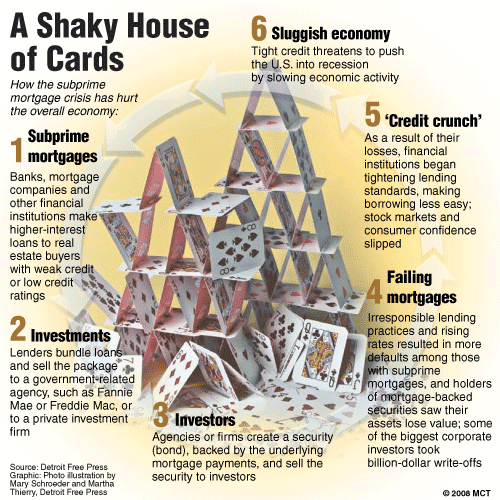| The
Credit Crunch! – How You Can Protect Yourself
As the credit crunch worsens, banks are collapsing.
Millions of people are facing financial ruin. Could this
happen to you? Here is how you can protect yourself!
BY
ROBERT R. FARRELL
Oct 29 2008
 These
are dangerous times! Global financial markets are in a crisis
unlike any since the Great Depression. The situation is
threatening to spin out of control. These
are dangerous times! Global financial markets are in a crisis
unlike any since the Great Depression. The situation is
threatening to spin out of control.
Consider the
following events in the United States, the world’s
largest economy. In August 2008, the unthinkable happened:
Two giants of the U.S. mortgage industry, Freddie Mac and
Fannie Mae, were taken over by the government to prevent
total collapse. These institutions, which together guarantee
nearly half of the nation’s mortgages, reportedly
needed a capital injection of $25 billion just to survive.
Next, financial
services behemoth Merrill Lynch, fast sinking under the
burden of billions of dollars in losses, desperately reached
a last-minute agreement to be taken over by Bank of America
for just two-thirds of its market value of one year ago.
Even worse, iconic
158-year-old investment bank Lehman Brothers shocked the
financial markets by filing for bankruptcy, drowning under
staggering debts totaling $613 billion. And in dramatic
fashion, the U.S. Federal Reserve (the “Fed”)
rushed to the rescue of the world’s largest insurance
company, AIG, pumping in $85 billion for an 80% stake in
the company.
All of these
problems in the world’s largest and most influential
economy have ignited a global firestorm. It has long been
thought that, financially, as the U.S. goes, so goes the
world. Europe and Japan are already in recession, and Britain
will soon follow (Daily Telegraph). Financial markets are
unraveling with a speed not seen since the stock market
crash of 1929. Fear pervades the world’s corridors
of power!
This predicament,
called the “credit crunch,” has put millions
of people at risk of losing their homes, and even their
life’s savings.
Extending Credit
The term “credit
crunch” is given to the reduction in the availability
of loans (credit). Simply put, banks have been reluctant
to lend money (extend credit) to others—whether to
individuals, businesses or other banks.
This was not
always the case. For several years leading up to summer
2007, the situation was entirely different. Banks were quite
eager to extend credit, particularly mortgages, to others.
The process worked
like this. After selling mortgages, retail banks passed
these on to investment banks to be bundled together as bonds
through a process called “securitization.” Rating
agencies, such as Standard & Poor’s and Moody’s,
then gave each of these bonds a rating, which were then
sold to investors, particularly large ones, including pension
funds, mutual funds, insurance companies and other corporations.
Once the bonds
were sold, the banks had effectively taken the payment risk
“off the books” and passed it on to investors,
whose receipt of income depended on homeowners’ ability
to pay their mortgages.
Greed Runs Rampant
The low interest
rate policy of the Fed was the trigger that started frenzied
buying in the U.S. housing market. Banks augmented the process
by offering low “teaser rates” on mortgages
to entice customers, rates that would be greatly increased
two to three years later, triggering even more buying. This
led to rapidly increasing housing prices, since demand exceeded
the supply of homes.
Banks, making
huge profits off the housing market and greedily pursuing
even greater profits, then relaxed their standards for loans.
Since they figured the risk was no longer on their books,
they offered loans to virtually anyone who applied. This
included individuals who did not meet their standards for
credit (“subprime” customers). So eager were
the banks, that even those with no jobs, no income and no
assets were accepted.
With “easy
money” to be had, everyone was in on the game. Banks
aggressively pursued and loaned money to people who did
not qualify. Applicants lied on their loan applications.
Rating agencies passed off risky bonds as “safe”—bonds
that investors rushed to purchase. Greed was in the air!
While home prices
kept rising, interest rates remained low, and customers
continued making their payments, this “house of cards”
held up. But
this was not to last.
Troubled Times
The scales tipped
when the first set of interest rate increases (resets) kicked
in. Around the same time, house prices fell slightly, resulting
from the glut in the market. Suddenly, millions of homeowners
were faced with much higher mortgage payments they could
not pay. Loan delinquencies soared. Repossessions of homes
skyrocketed. Investors backed away from risky bonds. Stuck
with loans they could not sell, banks began to fail.
The financial
carnage has been sobering. Great names from the past—Bear
Stearns, Countrywide Financial and now Lehman Brothers—no
longer exist.
The International
Monetary Fund (IMF) estimated that losses by U.S. banks
could reach as high as $1 trillion; some industry experts
believe this number could even reach as high as $2 trillion.
Since the beginning of 2008, over ten U.S. banks have gone
bankrupt, and it is believed that number could exceed 100
financial institutions within the next 12 months (Daily
Telegraph). Famous investor Wilbur Ross has placed the figure
at 1,000 (Reuters)!
A grim scenario
is rapidly unfolding, a financial catastrophe of epic proportions.
Millions of people in Europe, the United States and the
rest of the world will likely lose their homes, jobs and
savings. This could include you!

Protect Yourself
So how do you
protect yourself in these perilous times? First, realize
that there is a cause for every effect. Everything that
happens has an underlying reason.
The main motivating
factors behind the credit crunch were greed and covetousness.
Let’s understand. Banks were greedy for higher and
higher profits, investors took foolish risks in their greed
for higher returns on their investment, and individuals
were greedy for loans they could not repay, to purchase
the material goods they so coveted, yet could not afford.
Many are way over their heads in debt.
So what about
you? Here are some tips to help you survive the stormy times
ahead:
• Get out
of debt as soon as possible. If you need help with this,
seek professional financial counseling.
• Pay off
credit cards promptly; do not carry monthly balances. If
you are having difficulty controlling your spending habits,
consider closing your credit card accounts.
• Do not
buy an item unless you really need it.
• Avoid
buying on credit; pay cash whenever possible.
• Live
within your means. Set up a budget and stick to it. If you
have been living “high on the hog,” make and
execute a plan to lower your standard of living.
• Do not
borrow to pay for routine expenses.
• Before
making a large purchase, think for several days before purchasing
it. Ask yourself: Do I really need it?
Source: http://www.realtruth.org
|







 These
are dangerous times! Global financial markets are in a crisis
unlike any since the Great Depression. The situation is
threatening to spin out of control.
These
are dangerous times! Global financial markets are in a crisis
unlike any since the Great Depression. The situation is
threatening to spin out of control.